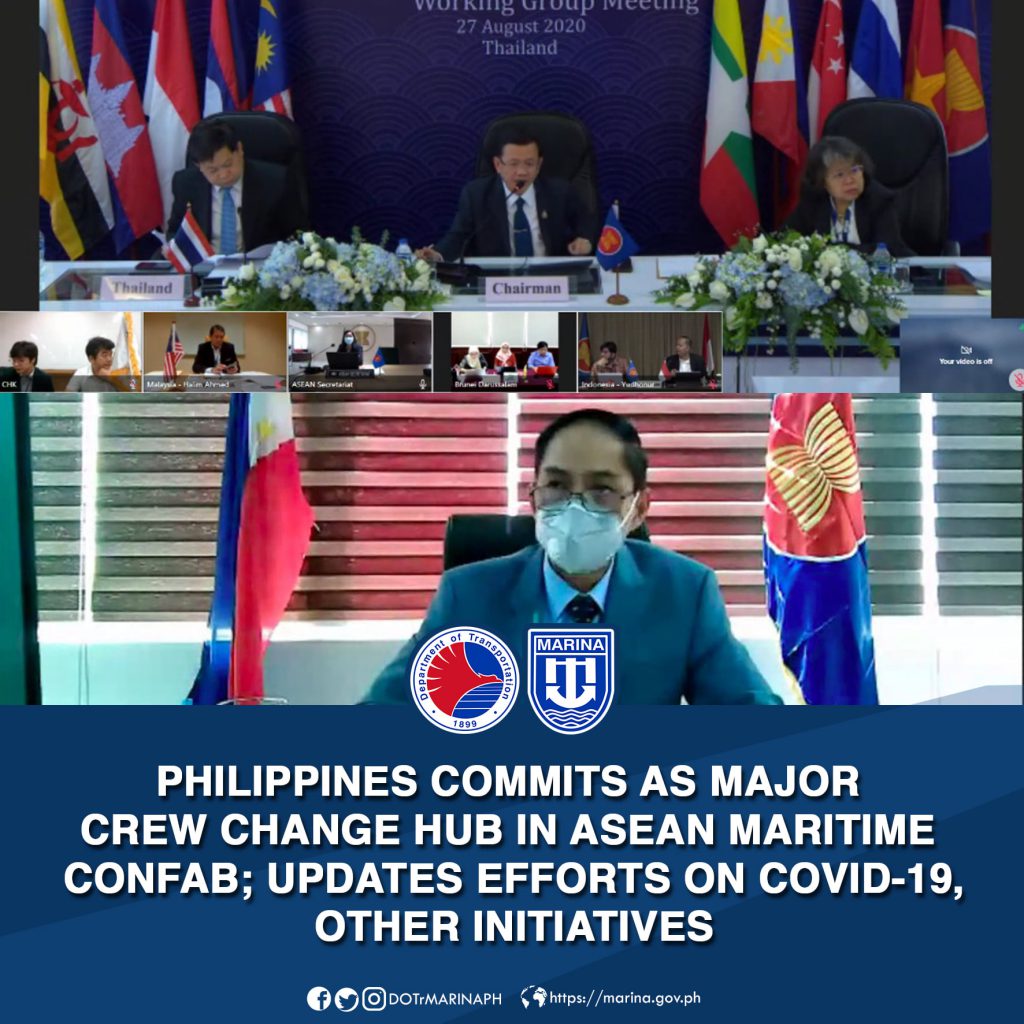
The Philippines, through the Maritime Industry Authority (MARINA), on Thursday committed itself to becoming a major international hub for crew change before the 39th Meeting of the Maritime Transport Working Group of the Association of Southeast Asian Nations (ASEAN) and its Dialogue Partners such as China, Japan, Korea and the International Maritime Organization (IMO). This is the first time that the meeting was held virtually amidst the COVID-19 pandemic.
MARINA Administrator Robert A Empedrad, who headed the Philippine Delegation, said that the Philippines as a responsible member of the international maritime community continues to cooperate with Member States for the facilitation and safe movement of the world’s seafarers noting their importance in the stability of the global seaborne trade. As a major provider of seafarers to the global labor market, he further mentioned that the Philippines has already opened the Ports of Manila, Bataan and Subic for international crew change and that the country is looking forward to the opening of its other international ports for this purpose.
“Given that seafarers play a crucial role in local and global maritime community, the welfare of these key workers should be of prime importance. As such, our maritime sector is working diligently to activate crew change hubs in the country to give maritime vessels the avenue to refresh their manpower, and to provide relief to our hardworking seafarers,” Empedrad said.
“They are the lifeline of the world’s economy as such they are our essential workers. In the Philippines, our seafarers are our indispensable partners for our country’s economic development.”
Philippines’ Maritime Initiatives amidst COVID-19 Pandemic
At this meeting, Administrator Empedrad assured that the Philippines continues to exert its utmost effort to keep the maritime industry afloat through a “whole-of-government approach” amidst the pandemic.
At this unprecedented time, he ensured that the supply chains, including the maritime sector in the Philippines, remain operational with the implementation of several measures such as the: 1) use of automated systems to lessen face-to-face transactions; 2) creation of a Shipping Protection Office, which protects both domestic and international shippers against unreasonable fees and charges imposed by the shipping lines; 3) decongestion of ports; 4) issuance of directive for all domestic shipping lines to provide cargo space and allocation for agricultural and food products, and providing preferential cargo rates; and 5) extension of STCW certificates for seafarers that are still on board ships.
Philippines’ Initiatives on the Implementation of Maritime Transport-Related Measures Under Kuala Lumpur Transport Strategic Plan (KLTSP)
The Kuala Lumpur Transport Strategic Plan (KLTSP) 2016-2025 is a 10-year masterplan for the ASEAN transport sector, which aims to enhance regional economic integration.
One of the projects under the KLTSP is the ASEAN Single Shipping Market (ASSM). Administrator Empedrad provided updates on the progress of the Pilot Project regarding the operationalization of ASSM, and coordination efforts to support the sustainability of Davao-General Santos-Bitung route Ro-Ro operation. The ASSM aims to improve the region’s logistics performance and international competitiveness.
Aside from ASSM, the Philippines conveyed its support and participation in the succeeding phase of the “Advanced Personnel Training Program for Vessel Traffic Service (VTS)” project as its ports acquire more VTS facilities and equipment to improve the delivery of service to stakeholders. The VTS refers to the marine traffic monitoring system established by harbour or port authorities.
Further, Administrator Empedrad also conveyed the country’s support to the ASEAN’s proposed project relating to the “Conduct of a package of ASEAN-China Maritime Transport Studies”. The said study aims at maximizing the potential of maritime trade between the ASEAN region and China through the assessment of economic benefits of the shipping network, and identification of possible cooperation areas.
This Year’s First ASEAN Maritime Transport Working Group (MTWG)
The 39th ASEAN MTWG meeting aims to provide updates on the status and implementation of the measures and strategic actions on maritime related programs, projects and activities under the KLTSP 2016-2025.
The said meeting was attended by the ASEAN Member States delegates from Thailand, Vietnam, Indonesia, Singapore, Brunei, Myanmar, Cambodia, Laos, and the Philippines. It is likewise participated by the dialogue partners from Japan, China, Republic of Korea and International Maritime Organization (IMO).
The ASEAN MTWG Meetings are being conducted twice a year to monitor the progress in the implementation of the KLTSP (2016-2025) and to discuss various ASEAN transport-related initiatives.


